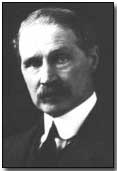Who's Who - Andrew Bonar Law
 Andrew Bonar Law was the Canadian-born
son of a Scottish clergyman. He worked as a boy on his fathers
smallholding. At 12 he went to live with his late mother's cousins who
were rich Glaswegian merchant bankers in Scotland.
Andrew Bonar Law was the Canadian-born
son of a Scottish clergyman. He worked as a boy on his fathers
smallholding. At 12 he went to live with his late mother's cousins who
were rich Glaswegian merchant bankers in Scotland.
He later worked in the family bank, while attending university night classes which gave him an interest in politics and debating. A t 27 he was making his fortune as an iron merchant but did not live extravagantly, having simple tastes.
With an inheritance which gave him financial independence, Bonar Law entered politics. In 1900 he was elected Conservative MP for Glasgow Blackfriars. He had a reputation for honesty and fearlessness, and was well regarded as an effective speaker.
These qualities promoted him to Parliamentary Secretary to the Board of Trade in 1902. He lost his seat in the 1906 Liberal landslide General Election. But he returned to represent Dulwich following a by-election later in the same year. Though hit hard by the death of his wife, he continued his political career, and won the Conservative party leadership in 1911 as a compromise candidate.
At the outbreak of war he offered the government the support of the Conservatives in the coalition government. Working closely with the Liberals caused Law to admire Lloyd George, to such a degree that he even declined the premiership in favour of Lloyd George's appointment.
He was given senior positions in Lloyd George's new war cabinet. His promotion reflected the great mutual trust between both leaders and made for a well co-ordinated political partnership. Their coalition was re-elected by a landslide following the Armistice.
Law had lost his two eldest sons in the war and his health deteriorated. To recover he resigned as Leader of the House and leader of his party. At the time many leading Conservatives were so enthralled by Lloyd George that they were considering leaving the Conservatives to join a new party Lloyd George was planning.
Law made a decisive rousing speech at the Conservative Carlton Club which changed their minds and saved the Conservative party. Law persuaded the Conservatives to end the coalition, and work as an independent party.
Conservative withdrawal forced Lloyd George to resign. The King then invited Law to form a new administration in 1922. Law's 'Tranquillity Manifesto' was an attempt to allow Britain to recover from war damage.
Though elected, Law lasted just 209 days in office. He resigned in May 1923 due to ill health, and died of throat cancer 6 months later. Dubbed rather unkindly as 'the unknown Prime Minister', most of Law's work was done before his premiership.
A popular but now little-noted Prime Minister, Law's funeral service took place in Westminster Abbey.
Article courtesy of 10 Downing Street website.
A Flechette was an anti-personnel dart dropped from an aircraft.
- Did you know?
